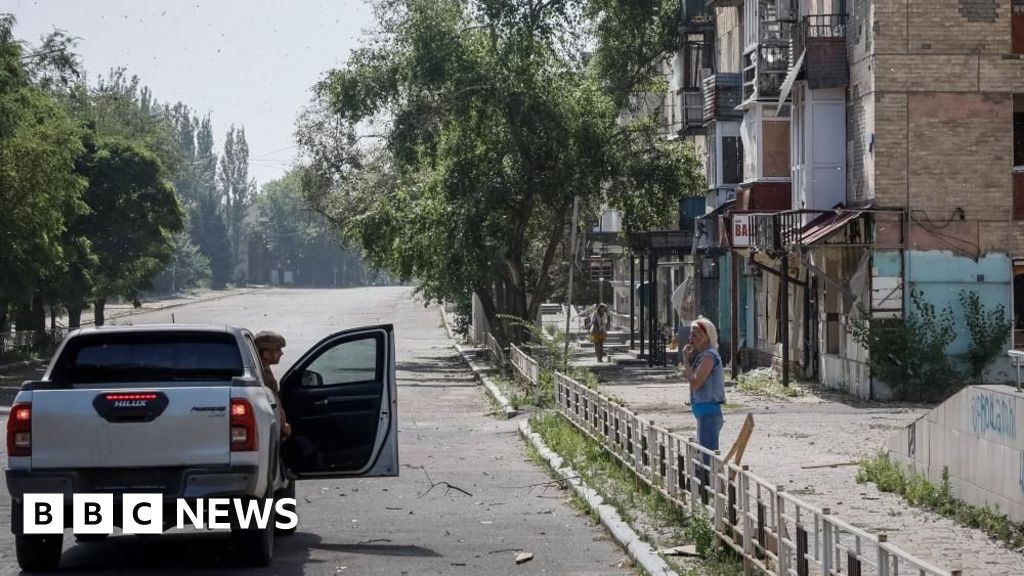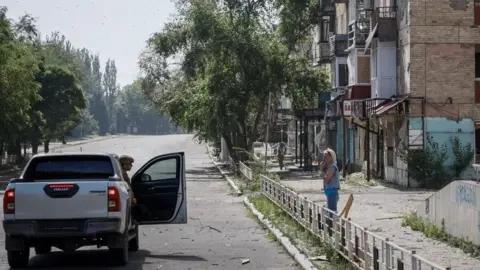 Getty Images
Getty ImagesRussia’s military says it has captured a small town in eastern Ukraine called Niu-York, as part of its push towards big population centres in the Donetsk region.
Ukraine’s military has not confirmed the loss of Niu-York, saying only that Russian forces are attacking close to the town and other areas. The army was giving the attacks “a worthy rebuff… and the fighting continues”, it said.
Although only a small settlement, controlling Niu-York would represent another step towards the two Donetsk hubs of Toretsk and Pokrovsk.
One of the aims of Ukraine’s seizure of territory in Russia’s Kursk region is thought to be to force Russia to move some of its forces away from the eastern campaign.
There is no indication so far of that happening, despite Ukraine’s commander-in-chief Oleksandr Syrskyi now claiming control of 93 Russian villages and towns.
President Volodymyr Zelensky described the situation in the east as difficult, but said Ukrainian troops were doing all they could to destroy the Russian forces. The military chief told a briefing that Russia was sending additional troops to the front line in the east.
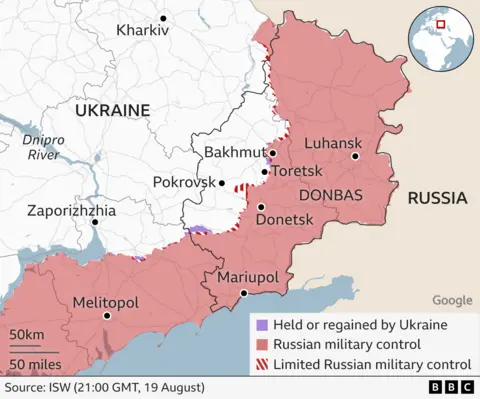
A Russia defence ministry statement said active operations by units of its Centre forces group had defeated Ukrainian troops, referring to Niu-York as “one of the largest settlements of the Toretsk agglomeration and a strategically important logistics hub”. It also called the town by the Russian name of Novgorodskoye.
Russian military bloggers shared footage late on Monday of a Russian tricolor flag being posted on the roof of a school in Niu-York with the Ukrainian flag lying on the ground.
However, the video first circulated two weeks ago and Ukrainian forces had since blown up the flag and damaged the roof with a drone on 8 August.
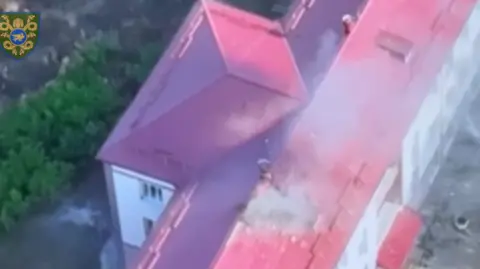 Ukraine 53rd Mechanised Brigade
Ukraine 53rd Mechanised BrigadeNiu-York is just south of the mining town of Toretsk, and Russian forces on Monday said they had also captured Zalizne, to the south-east of Toretsk.
Ukrainian forces said they were still fighting back in Zalizne and local sources were quoted as saying they still had control of 20% of Niu-York too, although they had far fewer reserves than the Russians.
On Monday, Ukrainian authorities ordered the evacuation of Pokrovsk, as Russian forces continue to advance on the town.
According to a military briefing on Tuesday, Russia had directed more than a third of its 87 attacks during the day on it push towards Pokrovsk. Local officials say Russia’s military is now about 10km (6 miles) from the outskirts of the town.
Regional head Vadym Filashkin has said 53,000 people still live in Pokrovsk, including almost 4,000 children.
Ukraine’s commander in chief said the counter-offensive in Russia’s Kursk region had now advanced 28-35km beyond the border, with 1,263 sq km under Ukrainian control and a total of 93 population centres.
Russian Defence Minister Andrei Belousov said three new military groupings had been formed to counter the Ukrainian operation in three border regions, Kursk, Belgorod and Bryansk.
Their task would be to protect “citizens and territories from attacks” from drones and other and other assault means.
Russian officials have played down the success of the Ukrainian operation in the Kursk region.
Maj Gen Apti Alaudinov, commander of Chechnya’s Akhmat special forces unit, told Russian TV that Ukraine’s military had sustained very serious losses.
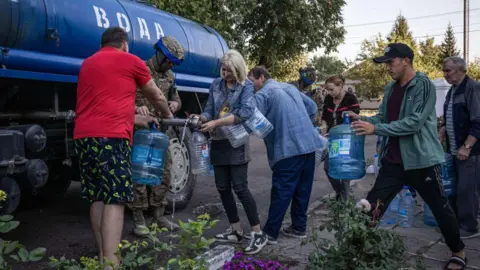 Getty Images
Getty ImagesAsked to respond to reports that three bridges had been blown up over the River Seym, cutting off evacuation and supply routes, he said “the fact that some bridge has been blown up doesn’t mean anything”.
However, state news agency Tass says local police are now having to use privately owned boats to get civilians to safety because bridges are down.
German photographer Nanna Heitmann said she had spoken to Russians in the region who were furious that state media were not giving the full picture: “They’re shocked, they are angry. A lot of people wait, thousands of people waiting in lines to find shelter, to find basic needs like blankets, pillows etc.”
Russia’s Vladimir Putin, who has appeared wrong-footed by the Ukrainian offensive, compared it on Tuesday to a 2004 school massacre by Chechen militants in Beslan where more than 300 people were killed.
On a visit to the school and to mothers of the victims in North Ossetia, he said “just as we fought with terrorists previously, now we fight with those who commit crimes in Kursk region, Donbas and Novorossiya”, using an old Russian imperial term for areas of occupied Ukraine.
Additional reporting by BBC Verify

